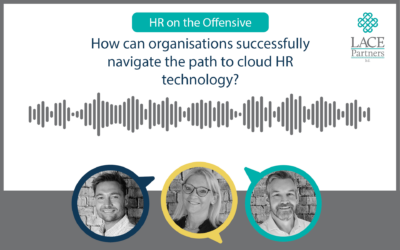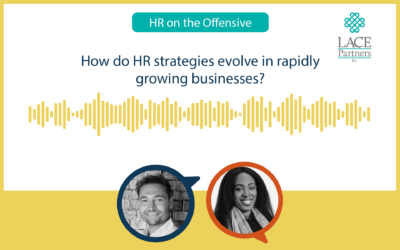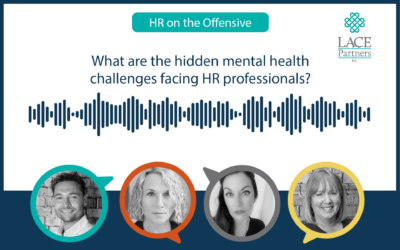It’s the new year, the Christmas trees are being taken down, the mistletoe has been put into the composter and HR teams across the land are looking at how to make 2024 the best year yet for their business. As is now tradition at LACE HQ, we’ve got our heads together and noted a few trends and predictions for the year ahead, that we’re sharing in today’s blog. Have a read below of what the ‘big ticket’ items we think might be front and centre of HR’s mind this year, then let us know what you think using the form below.
The employee experience revolution will be not televised (but it will stay high on the agenda)
Employee experience will remain high on the agenda for Chief People Officers (CPOs), HR & Payroll teams – but with a renewed focus on demonstrating value to the business, proving it isn’t just ‘fluff’ but by investing in all components of an employee’s experiences at work (human / digital / physical) there are significant reputational and financial gains to be made.
Part of this is means HR will need to look at the way they operate to deliver integrated experiences. We are already seeing organisations explore more agile, experience-led operating models, some going as far to combine with their customer experience teams. This is critical to ensure ongoing focus and ownership of experience – however ownership of experience needs to be embedded throughout the organisation – HR must pioneer and champion but aren’t responsible for all facets of the experience so the C-suite need to foster a mindset of collective ownership and collaboration.
For payroll teams the focus will be on how the function cannot just ‘do the basics’ of getting people paid, but how it can have an even greater impact through initiatives such as mobile payslips, just in time pay, etc.
Today’s increasingly volatile and often ambiguous business environment has forced organisations to transform at an unprecedented pace. For some, to do this at speed as meant the experience hasn’t been put front and centre when implementing new technology or ways of working and they are now struggling to realise the return on their investments. These organisations will need to pause and reflect and think about how they can truly optimise to deliver exceptional experiences that stick.
Get beyond the buzz – the future of work and impact of AI
In 2023 there were few buzzwords buzzier than “AI” and we expect that trend to continue in 2024. However, what will shift is the focus from “noise” to “action”. Now that every CEO, CPO and consultancy has espoused the importance of generative AI to our future, 2024 will herald its integration and application into mainstream business processes and operations. From generative AI tools like ChatGPT to the Microsoft 365 “co-pilot”, AI is here to stay and the age of “Augmented Workforce” between humans and machines has truly begun. Within HR look out for a host of preparatory activities, from data cleansing to focused talent acquisition, all focused on increasing organisational readiness for AI implementation. Expect increased use of AI-driven predictive recommendations and a leading role for HR in establishing the policies, governance and ethics required to embed AI in a business, all against the backdrop of significant competition for scarce, AI-cognisant employees. Change management will play a critical role – ironically itself be aided by AI-drive change tools. 2024 promises to be an exciting, possibly transformative year.
OpenAI has recently announced that it will be enabling businesses to customise ChatGPT. The other generative large language model (LLM) providers will inevitably follow suit. The implications for this for HR and other functions (if you could use the technology but protect your own data by keeping it locked behind a company firewall, for example) is yet to be fully understood, but it will be something to watch out for in 2024.
Recognising the value of People and business transformation
In 2024, we think that supporting business transformation will be a critical CPO agenda item for many – if not all – organisations. During 2023, we saw many questions from our clients about how the world of work might be impacted by AI, climate change, remote working and the mixed economic environment. While some of these impacts are longer term, they set the context for wider business transformation.
We conducted research with around 30 organisations (we’ll be sharing the results of this in a few weeks’ time, so keep your eyes peeled) and we found that there is strong demand from business stakeholders for HR to play an even more significant role in transformation. However, in many cases, HR is struggling with issues around capacity, skillset and mindset to perform this role.
There are some People functions with a “well-oiled machine” around supporting business change. In effect “change is business as usual”. But many find their existing capability is not yet fit for purpose. We have seen People functions changing how they support business by refining the role of the HR Business Partner, joining up and consolidating functions such as organisation design, change, workforce planning and analytics and by closer working with strategic finance and IT change.
There will also be a renewed determination to be investing in strategic talent, skills insights and decision making. In the longer term, People functions will need to engage even further on the work that people do and how this will evolve. We will be exploring more of these themes in our research paper on workforce transformation to be published in the coming weeks.
A reshaping of the ‘perfect storm’ on skills and jobs?
Uncertainty in the geo-political landscape, predictions of slow economic growth mean turbulent times for talent. Amidst the critical skills shortage, employer hiring appetite has waned in the second half of 2023. This ‘perfect storm’ calls for a radically different approach to talent, and so in 2024 we will see companies embrace a skills-based talent practices to re-skill internal talent rather than hiring externally. To make this happen, we will see talent mobility and talent development as business enablers.
At the same time, the use of generative AI will be supercharged to revolutionise how work gets done. We will see a rise in work design (rather than job design), through assessing each task and identifying where technology can enhance and change the work. Instead of these efficiency gains resulting in headcount reductions, we are far more likely to see time being spent on upskilling, reskilling, and redeploying talent to demand.
These exciting developments are only possible when they are reflected in a talent strategy that shows a clear pathway to meet business demand through innovative skills and job design practices. To do this, we will see People and Talent teams partnering with AI experts within the organisation to determine the art of the possible, updating the strategy as new technologies arise.
Do our predictions resonate with you? Where do you think the big challenges and opportunities lie for HR in 2024? Are there any you’d like to chat with our team about? Get in touch with us today and tell us what you think.






